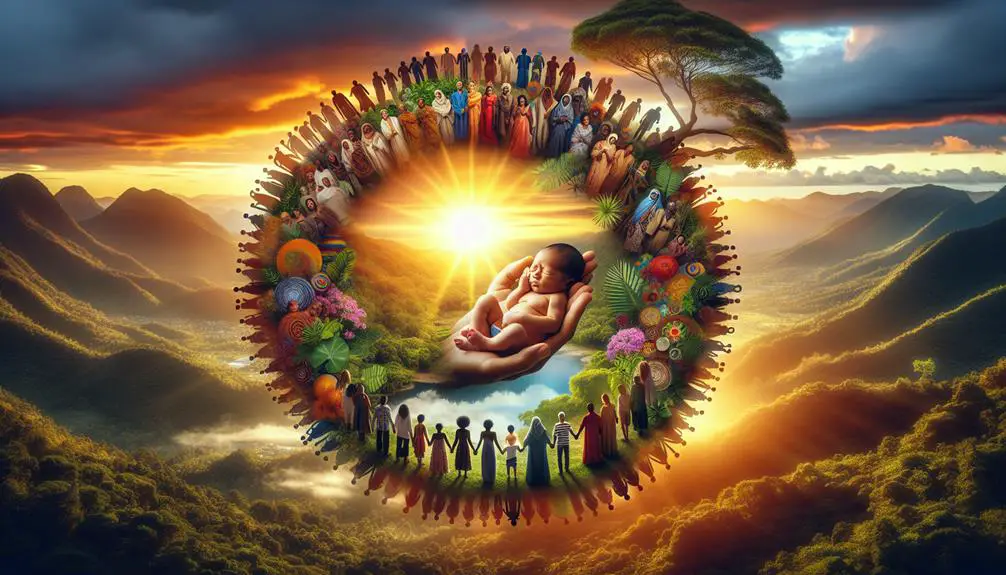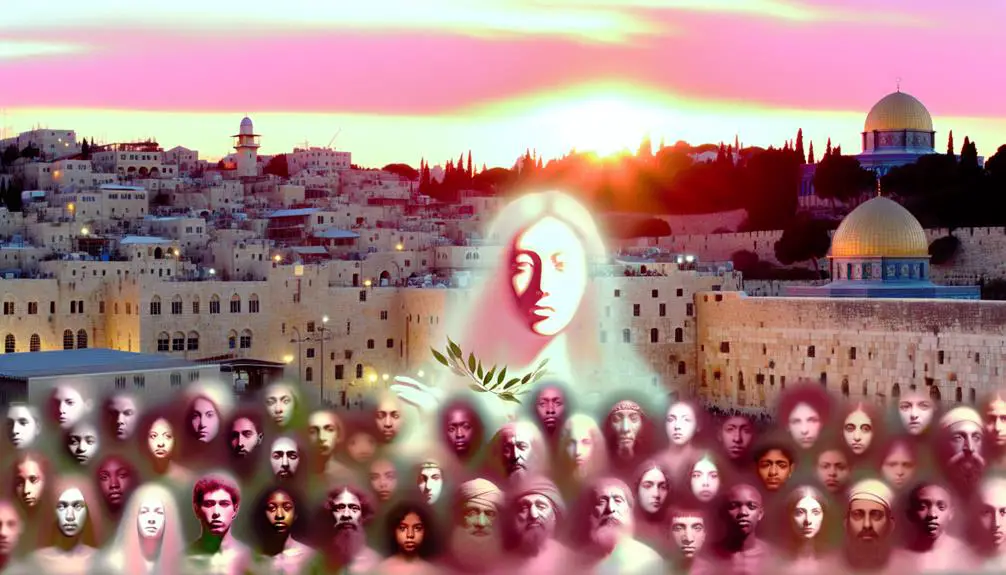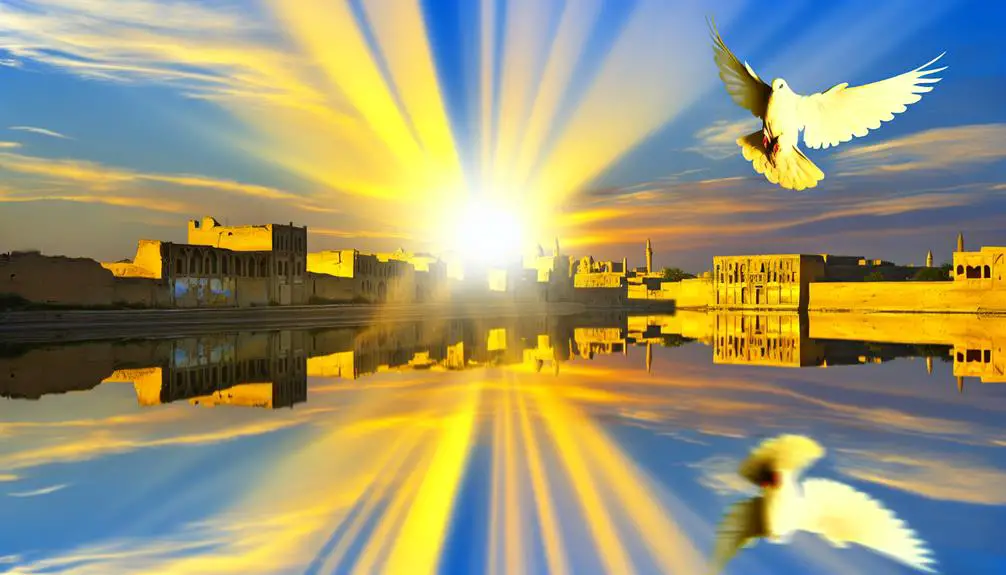Keep wondering how a single day can birth a nation, as this Bible verse unveils the mysteries of nationhood and divine intervention.

Can a Nation Be Born in a Day Bible Verse
As you ponder the monumental events in history, it's almost serendipitous that the question, 'Can a nation be born in a day?' finds its roots in a Biblical verse.
You're not alone in wondering how this ancient text, steeped in theological intrigue, speaks to both historical occurrences and the concept of nationhood. This phrase invites you to explore the layers of its biblical origins, the context in which it was written, and how it resonates or conflicts with modern understandings of nation-building.
The journey through its interpretive landscape might just change your perspective on the power of a day in shaping the fate of nations.
Key Takeaways
- Isaiah 66:8 symbolizes the miraculous birth of a nation, emphasizing swift transformation and divine intervention.
- The verse invites reflection on the dynamics of nation formation, blending divine providence with human agency.
- Theological interpretations of the verse offer varied perspectives on prophecy fulfillment and spiritual rebirth.
- Its relevance today is seen in societal and spiritual transformations, encouraged by rapid changes and technological advancements.
Biblical Origins

The concept of a nation being born in a day originates from a specific verse in the Bible, Isaiah 66:8, which poses a rhetorical question highlighting the swift and miraculous nature of such an event. This idea, while seemingly fantastical, carries deep cultural implications when you delve into its interpretation. It suggests a transformation that transcends human timelines and expectations, a phenomenon that not only reshapes geographical boundaries but also redefines cultural identities.
Analyzing this concept, you're invited to consider the significant role genealogical records play in understanding the formation of a nation. These records aren't just lists of names; they're the fabric of a nation's heritage, tracing the lineage and origins of its people. In the context of Isaiah 66:8, the swift birth of a nation implies a sudden aggregation of diverse genealogies, merging into a unified national identity.
This miraculous birth, then, isn't merely a physical or political event. It's deeply intertwined with the cultural DNA of a people, reshaping not only territorial lines but also the ancestral narratives that define them. The verse challenges you to rethink the dynamics of nation-building, viewing it not just as a historical or political process but as a profound transformation of collective identity.
Historical Context
How does the historical backdrop of Isaiah 66:8 enrich our understanding of the conceptual birth of a nation in a singular, transformative moment? This verse, often interpreted symbolically, sits deep within a complex matrix of ancient geopolitical dynamics. You're navigating through a period where nation formation wasn't merely a matter of drawing lines on a map but entailed profound socio-political, religious, and cultural metamorphoses.
- *Isaiah's context was a time of intense geopolitical flux, influencing how communities conceptualized their identities and sovereignty.*
- *The prophetic imagery of childbirth as a metaphor for nation formation speaks volumes about the perceived suddenness and intensity of such transitions.*
- *Examining the verse against its historical backdrop reveals the intricate interplay between divine providence and human agency in the birth of nations.*
This analysis underscores that the conceptual birth of a nation, as depicted in Isaiah 66:8, is more than a literal event. It's a symbol of hope and renewal amidst geopolitical upheavals. The historical context thus not only enriches your understanding of this transformative moment but also invites you to ponder the geopolitical implications inherent in the process of nation formation.
Theological Interpretations

Shifting focus to theological interpretations, it's crucial to explore how Isaiah 66:8 has been understood through the lens of faith, illuminating the verse's profound spiritual significance and its implications for the concept of national rebirth.
The verse has stirred diverse theological interpretations, each enriching the discourse on prophecy fulfillment and spiritual rebirth. Let's delve into these perspectives through an analytical lens.
Interpretation Framework |
Implication for Spiritual Rebirth |
|---|---|
Preterist |
Prophecy fulfillment seen in historical events, suggesting spiritual rebirth can manifest in tangible, earthly changes. |
Futurist |
Views the verse as predicting future events, emphasizing an ultimate spiritual rebirth yet to come. |
Idealist |
Focuses on the symbolic, teaching that spiritual rebirth is an ongoing, personal journey. |
Historicist |
Interprets the verse as unfolding through history, indicating a gradual collective spiritual rebirth. |
Eclectic |
Combines elements from all frameworks, suggesting a multifaceted approach to understanding spiritual rebirth. |
Each framework offers a unique lens to view prophecy fulfillment, emphasizing the multifaceted nature of spiritual rebirth. This analysis invites you to ponder the profound implications of Isaiah 66:8 beyond its literal interpretation, enriching your understanding of spiritual transformation and national renewal.
Modern Relevance
In today's rapidly changing world, Isaiah 66:8's inquiry into whether a nation can be born in a day holds profound implications for understanding contemporary societal transformations and spiritual rebirth. This verse, often interpreted in a literal and metaphorical sense, resonates with the global implications of sudden changes within societies and the collective consciousness of communities. It prompts you to consider the dynamics of societal transformation in the modern era, where political, social, and technological shifts can indeed reshape national identities and collective beliefs virtually overnight.
- Rapid Technological Advancements: The digital revolution has enabled ideas and movements to spread with unprecedented speed, facilitating the birth of new societal norms and values at a rate never seen before.
- Political Revolutions and Reforms: Recent history is rife with examples of political upheaval leading to the swift reformation or establishment of national identities and governance structures.
- Social Movements: Grassroots movements, powered by social media, can mobilize large populations around a common cause, leading to significant societal changes within a remarkably short time frame.
These elements underscore the modern relevance of Isaiah 66:8, illustrating how the concept of a nation—or a collective identity—being born in a day isn't only feasible but increasingly observable in today's interconnected world.
Reflective Insights

Reflecting on the modern relevance of Isaiah 66:8 reveals deeper insights into the nature of societal and spiritual transformations. You're invited to consider how this passage not only speaks to historical moments but also illuminates the ongoing potential for miraculous events and divine intervention in our time. This verse challenges you to recognize that the seemingly impossible can occur, often when least expected, underpinning the belief in sudden, profound change as a hallmark of divine action.
Analyzing this concept, you realize that societal shifts, often perceived as gradual, can indeed happen with startling rapidity, echoing the biblical sentiment of a nation's birth in a day. This isn't just about political boundaries but encompasses the birth of new ideologies, movements, and collective awakenings. The divine intervention alluded to isn't always supernatural; rather, it's frequently manifested through human actions inspired by a higher calling or purpose.
Hence, your understanding of this verse should extend beyond its literal interpretation. It's a metaphor for the power of collective human effort, guided by a sense of divine purpose, to enact significant change. In essence, it's an encouragement to remain open to the possibilities of transformation, recognizing that with divine intervention, what seems unattainable might just be within reach.
Frequently Asked Questions
How Has the Phrase "Can a Nation Be Born in a Day?" Been Used in Political Speeches or Movements Around the World?
You've seen the phrase 'can a nation be born in a day?' pop up in political speeches and movements, especially during independence movements and political transitions. It's a powerful rhetorical question that challenges and inspires.
Leaders use it to emphasize the rapid change and the birth of new nations, rallying support and hope among their followers.
It's a symbol of sudden transformation, embodying the possible against seemingly insurmountable odds.
Are There Any Notable Artworks, Songs, or Literary Works Inspired by the Verse "Can a Nation Be Born in a Day?"?
You're exploring how the notion of rapid transformation has influenced art and music. Consider Leonard Cohen's 'Hallelujah,' though not a direct adaptation, its biblical allusions echo the dramatic change encapsulated in 'can a nation be born in a day?'
Artistic interpretations and musical adaptations of such themes delve deep into the collective psyche, analyzing how pivotal moments can redefine societies.
This exploration offers a nuanced understanding of cultural and historical shifts, reflecting on the power of instantaneous change.
Have There Been Any Scientific or Sociological Studies Examining the Rapid Formation of National Identity in the Context of This Biblical Verse?
You're exploring how quickly nations can form, focusing on cultural integration and identity formation. Scholars have indeed examined these phenomena, analyzing cases of rapid national identity emergence.
Their studies often delve into how shared experiences, crises, or movements can accelerate cultural integration, fostering a collective identity. This process, while complex, highlights the dynamic nature of how communities evolve into nations, offering insights into the mechanisms driving rapid identity formation.
Can the Concept of "A Nation Being Born in a Day" Be Applied to Virtual or Online Communities in the Digital Age?
In today's digital whirlwind, the idea of a nation being born in a day isn't just a fantasy. Virtual citizenship and digital sovereignty are weaving a new tapestry of community online.
You've seen how rapidly these virtual communities can form, centered around shared interests or goals, embodying characteristics of a nation. Analyzing this phenomenon, it's clear that in the digital age, the birth of a nation overnight isn't just possible; it's happening.
How Have Different Religious Denominations Outside of Christianity Interpreted or Referenced the Verse "Can a Nation Be Born in a Day?" in Their Teachings or Scriptures?
You've ventured into how various religious denominations beyond Christianity view the idea of a nation's swift emergence. Through interfaith dialogues, you'll find that scriptural comparisons often reveal nuanced interpretations.
Whether in teachings or scriptures, these communities might reference similar concepts differently, reflecting diverse theological frameworks. Analyzing these perspectives, you'll uncover that the essence of rapid transformation resonates, albeit in varied forms, across religious boundaries, enriching your scholarly exploration.
Conclusion
In exploring the profound query, 'Can a nation be born in a day?' you've journeyed through biblical origins, delved into historical contexts, unraveled theological interpretations, and pondered its modern relevance.
Through reflective insights, it's evident that this question transcends mere historical curiosity, embodying themes of transformation, renewal, and divine intervention.
As nations evolve and identities form, the biblical metaphor resonates deeply, reminding us that monumental change, though seemingly sudden, is often rooted in a rich tapestry of faith, perseverance, and collective aspiration.



Sign up